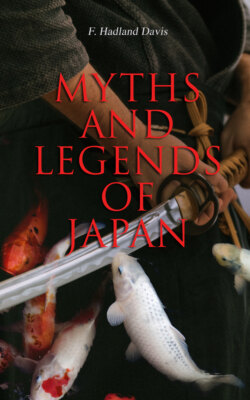Читать книгу Myths & Legends of Japan - F. Hadland Davis - Страница 17
На сайте Литреса книга снята с продажи.
Yoshitsune and the Taira
ОглавлениеYoshitsune's father, Yoshitomo, had been killed in a great battle with the Taira. At that time the Taira clan was all-powerful, and its cruel leader, Kiyomori, did all he could to destroy Yoshitomo's children. But the mother of these children, Tokiwa, fled into hiding, taking her little ones with her. With characteristic Japanese fortitude, she finally consented to become the wife of the hated Kiyomori. She did so because it was the only way to save the lives of her children. She was allowed to keep Yoshitsune with her, and she daily whispered to him: "Remember thy father, Minamoto Yoshitomo! Grow strong and avenge his death, for he died at the hands of the Taira!"
When Yoshitsune was seven years of age he was sent to a monastery to be brought up as a monk. Though diligent in his studies, the young boy ever treasured in his heart the dauntless words of his brave, self-sacrificing mother. They stirred and quickened him to action. He used to go to a certain valley, where he would flourish his little wooden sword, and, singing fragments of war-songs, hit out at rocks and stones, desiring that he might one day become a great warrior, and right the wrongs so heavily heaped upon his family by the Taira clan.
One night, while thus engaged, he was startled by a great thunderstorm, and saw before him a mighty giant with a long red nose and enormous glaring eyes, bird-like claws, and feathered wings. Bravely standing his ground, Yoshitsune inquired who this giant might be, and was informed that he was King of the Tengu—that is, King of the elves of the mountains, sprightly little beings who were frequently engaged in all manner of fantastic tricks.
The King of the Tengu was very kindly disposed towards Yoshitsune. He explained that he admired his perseverance, and told him that he had appeared upon the scene with the meritorious intention of teaching him all that was to be learnt in the art of swordsmanship. The lessons progressed in a most satisfactory manner, and it was not long before Yoshitsune could vanquish as many as twenty small tengu, and this extreme agility stood Yoshitsune in very good stead, as we shall see later on in the story.
Now when Yoshitsune was fifteen years old he heard that there lived on Mount Hiei a very wild bonze (priest) by the name of Benkei. Benkei had for some time waylaid knights who happened to cross the Gojo Bridge of Kyōto. His idea was to obtain a thousand swords, and he was so brave, although such a rascal, that he had won from knights no less than nine hundred and ninety-nine swords by his lawless behaviour. When the news of these doings reached the ears of Yoshitsune he determined to put the teaching of the King of the Tengu to good use and slay this Benkei, and so put an end to one who had become a terror in the land.
One evening Yoshitsune started out, and, in order to establish the manner and bearing of absolute indifference, he played upon his flute till he came to the Gojo Bridge. Presently he saw coming towards him a gigantic man clad in black armour, who was none other than Benkei. When Benkei saw the youth he considered it to be beneath his dignity to attack what appeared to him to be a mere weakling, a dreamer who could play excellently, and no doubt write a pretty poem about the moon, which was then shining in the sky, but one who was in no way a warrior. This affront naturally angered Yoshitsune, and he suddenly kicked Benkei's halberd out of his hand.
Yoshitsune and Benkei attacked by a ghostly company of the Taira Clan.
